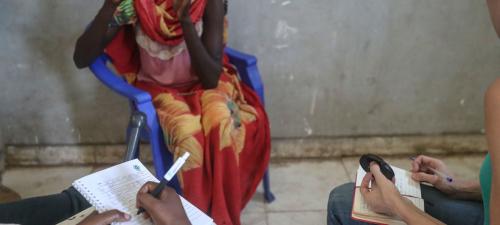Protect women’s rights ‘before, during and after conflict’ UN chief tells high-level Security Council debate
Over the course of the past decade, there has been “a paradigm shift” in understanding the devastating impact of sexual violence in conflict on international peace and security, UN Secretary-General António Guterres told the Security Council during a high-level debate on Tuesday.

A South Sudanese rape victim narrates her ordeal at an undisclosed location near Bentiu town. (December 2018)
“Local civil society organizations, many of them women’s organizations, are on the frontlines of our efforts to prevent and provide redress for this crime, and they deserve our strong and consistent support” he said at the meeting marking the 10th anniversary of the adoption of resolution 1888, which created the mandate of the Special Representative on Sexual Violence in Conflict.
The scourge “largely affects women and girls because it is closely linked to broader issues of gender inequality and discrimination”, Mr. Guterres said, adding that “prevention” must be based on “promoting women’s rights and gender equality in all areas, before, during and after conflict”.
“This must include women’s full and effective participation in political, economic and social life and ensuring accessible and responsive justice and security institutions”, he said.
Mr. Guterres also recognized the links between sexual violence in conflict, gender inequality and discrimination, and violent extremism and terrorism.
“Extremists and terrorists often build their ideologies around the subjugation of women and girls and use sexual violence in various ways, from forced marriage to virtual enslavement”, he explained. “Sexual violence continues to fuel conflict and severely impacts the prospects for lasting peace”.
“I encourage this Council to include the prevention of conflict-related sexual violence in all your country-specific resolutions, and in the mandates of peace operations”, he said.
Mr. Guterres stressed the need to strengthen justice and accountability, saying that despite a handful of high-profile convictions, “there is widespread impunity for sexual violence in conflict” and that most “are never reported, investigated and much less prosecuted”.
He encouraged the Council to continue working together “to reconcile differences”, as the “global “response to these crimes must ensure punishment of the perpetrators and comprehensive support to survivors with full respect for their human rights”.
“Together, we can and must replace impunity with justice, and indifference with action”, stressed the Secretary-General.
‘Utterly shell-shocked’ communities
Although stigma and other social barriers contribute to the chronic underreporting of sexual violence, the UN Special Representative on Sexual Violence in Conflict, Pramila Patten, told the Council that “we now understand much more about its many forms, drivers, and impacts, and about the devastating physical, psychological, and social burdens survivors bear”.
And yet, after a decade of concerted attention and action to deal with this crime, she spelled out: “Wars are still being fought on, and over, the bodies of women and girls”.
“Sexual violence fuels conflict and severely impacts the prospects for lasting peace” Ms. Patten stated, adding that it is used “precisely because it is such an effective means to target individuals and devastate entire communities”.
The UN envoy painted a picture of victims targeted because of their ethnic, religious, political or clan affiliation.
Ms. Patten recounted a visit to South Sudan where she was “horrified” by the “sheer brutality of the sexual violence, perpetrated along ethnic lines against women and girls, even children as young as 4 years”.
She described “utterly shell-shocked” communities in the UN Protection of Civilian site in the capital, Juba, who were ganged raped and abducted for sexual slavery.
“Imagine a desperation so raw that parents would marry their daughter off to one stranger to spare her rape by many”, she asserted.
“If we are ever to prevent these crimes from occurring in the first place, we must confront the unacceptable reality that it is still largely cost-free to rape a woman, child or man in armed conflicts around the world”, she said. “To turn the tide, we must increase the cost and consequences for those who commit, command or condone sexual violence in conflict”.
“We must convert a centuries-old culture of impunity into a culture of accountability,” concluded the Special Representative.
Source:United Nations
- 450 reads
Human Rights
Fostering a More Humane World: The 28th Eurasian Economic Summi

Conscience, Hope, and Action: Keys to Global Peace and Sustainability

Ringing FOWPAL’s Peace Bell for the World:Nobel Peace Prize Laureates’ Visions and Actions

Protecting the World’s Cultural Diversity for a Sustainable Future

Puppet Show I International Friendship Day 2020

